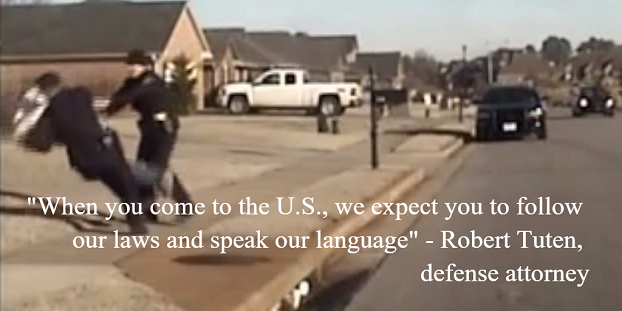
The legal profession has long been an elitist, white man’s world. Increasing numbers of female lawyers address part of this homogenous history, but white privilege still governs. I see it in the hallways at law school, in many offices I interviewed with for summer internships, and the assumptions around access to education, wealth, or even appropriate attire.
I saw it just last week in the trial (now mistrial) of officer Eric Parker, who found it necessary to throw down to the ground a 57-year-old Sureshbhai Patel in Madison, Alabama, in February of this year. Mr. Patel was here visiting his family and grandson. He did not know English. The takedown left Mr. Patel partially paralyzed.
At trial, defense attorney Robert Tuten found it appropriate to state the following: “When you come to the U.S., we expect you to follow our laws and speak our language,” and that “Mr. Patel bears as much responsibility for [his partial paralysis] as anyone.”
“I could not fathom Mr. Tuten’s audacity to share such a sentiment in open court.”
When I first read that quote, I could not fathom Mr. Tuten’s audacity to share such a sentiment in open court: that it was Mr. Patel’s responsibility, a visitor lawfully in the country, to satisfy Mr. Tuten’s own arbitrary requirements of Americanness, not specified anywhere in the Constitution.
But then I thought of Mr. Tuten within the larger framework of the legal profession. I recognize that my purview, at the moment, is limited to law school. Too often, law professors teach doctrinal classes in a vacuum, without any societal contextualization. I’ll explain. When a property professor fails to emphasize that America is based on the outright taking of Native American land, or a criminal law professor refuses to recognize how race plays a role in the charging and convictions of defendants, law students are being robbed of responsible education.
To compound the lack of contextualization, there are often not any or enough “diverse” students who could even offer push back to a professor. In California, this lack of numbers is in large part due to the approval of Prop 209 in 1996, which banned the consideration of race in California’s public institutions admissions. Overall, however, lack of diversity is simply indicative of admissions offices that may not prioritize the need to admit diverse applicants.
Thus, although lawyers developed the lens of critical race theory, which posits that racial subordination is embedded throughout the history of American law, the legal field itself, in both education and profession is still struggling to quantitatively and qualitatively respond to its own lack of diversity.
This is why diversity matters. In theory, the law governs us all. But when the law is taught and learned without the context of privilege, wealth, or racial disparities, the law will be practiced in such a way as well — at the expense of minorities, poor, or otherwise non-normative people.
“Within that one quote lies assumptions of whiteness, of literacy access, and geographic privilege.”
Robert Tuten’s remarks were outright racist. Within that one quote lies assumptions of whiteness, of literacy access, and geographic privilege. Without the Other — people of color, people from different socioeconomic backgrounds, queer people, trans people, differently abled people, and the list continues — assumptions like that of Mr. Tuten will not change. There is no need to accommodate, understand or respect the Other if there is no Other pushing back.
The Supreme Court has recognized, in Grutter v. Bollinger, 539 U.S. 306 (2003), that diversity within the classroom not only fosters thriving, perhaps positively contentious class conversation, but also contributes to educating and graduating diverse leaders of tomorrow. Investing in substantive diversity today will contribute to a society that is culturally competent, and whose perspectives can accommodate the many ways Americans, its visitors, and its immigrants interact with the law.
Tuten’s remarks serve as a reminder that substantive diversity in the legal profession, despite efforts by some law schools and diversity scholarships from big firms, is far from reaching its potential.
* * *
Jasleen Singh is a second year at Berkeley Law and the Director of the Sikh Monologues Project. She is passionately invested in projects that create safe spaces for women and minorities, and is devoted to coffee shops, traveling, and the concept of storytelling.













ur awesome
Brilliantly articulated !! U do us proud.
Thought provoking piece. Thanks for exposing that. Can’t believe that this simpleton Tuten made that statement.
the law is an inherently white supremacist institution. i don’t have as much faith as you do in diversity’s potential to change that. from my experiences as a sikh woman at boalt, all i’ve seen happen is POC assimilation into the white power structure. good luck with your firm summer?